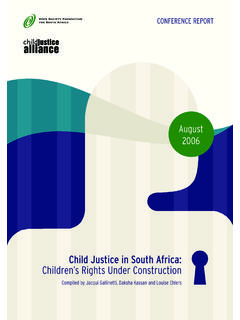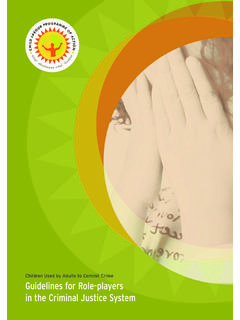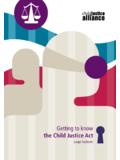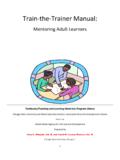Transcription of The Mpofu case - Child Justice
1 Volume 15 Number 1. May 2013. THE DYNAMICS OF YOUTH Justice & THE CONVENTION. ON THE RIGHTS OF THE Child IN SOUTH AFRICA. Section 100(2), Law of the Child Act, No. 21 of 2009, Republic of Tanzania Where in the course of any proceedings in a court it appears to the court that the person charged or to whom the proceedings relate is a Child , the court shall stay the proceedings and commit the Child to the Juvenile Court.'. The Mpofu case Sentencing of Child offenders in serious cases by Ann Skelton, Professor of Law and Director, Centre for Child Law Sentencing of Child offenders in serious cases came under consideration commission of the offence, an issue to which by the Constitutional Court in the recent appeal of Mandla Trust Mpofu v the court had paid little attention . His appeal the Minister of Justice and Constitutional Development and Others (Centre rested on a violation of his rights under section for Child Law as amicus curiae) CCT 124/11 [2013] ZACC 15.
2 Mpofu had 28 of the Constitution. The Centre for Child Law been sentenced to a term of life imprisonment, coupled with 28 years entered as amicus curiae in the Mpofu case , imprisonment (to run concurrently). His crime was a serious one - he had in order to reiterate the different approach to killed a man in the course of a house robbery. He also had a prior conviction sentencing of Child offenders required by the for robbery. The sentence was handed down in 2001, and his appeal rested Constitution and international law. on his claim that he had been below the age of 18 years at the time of the Continued on page 2. 1. EDITORIAL Continued from page 1. The majority decision A warm welcome, dear reader, to the first edition of Article 40 for 2013! Mpofu 's appeal against his sentence of This year marks the third anniversary of the implementation of the Child imprisonment for life was dismissed by the Justice Act of South Africa and the Child Justice Alliance continues to keep majority of the Constitutional Court.
3 The a sharp focus the impact of the Act on the administration of Justice to majority judgment stressed that if he had children in South Africa. been in a position to prove that he was below the age of 18 years at the time of This edition opens with an article on the recent judgment of the the commission of the offence, the matter Constitutional Court in the appeal of Mandla Trust Mpofu v the Minister of Justice and Constitutional Development and Others (Centre for Child would have been very different because, as Law as amicus curiae) CCT 124/11 [2013] ZACC 15. The case addressed Skweyiya J (writing for the majority) put it, the question of sentencing of Child offenders, taking into account section [C]hildren's rights are of utmost importance 28 of the Constitution. Prof Ann Skelton, Director of the Centre for Child in our society.
4 Courts are required to Law sheds light on the reasoning of the majority and minority decisions distinguish between children and adult of the Court. She then shows the significance of the judgment in guiding offenders when sentencing and children other courts in the appropriate sentencing of Child offenders for serious must enjoy preferential sentencing treatment'. offences and the future implications of the judgment on section 77(1)(a) [para 58]. However, as the appellant failed of the Child Justice Act. to establish that he was indeed a Child at the time of the commission of the offence, The second article presents the findings of a situational analysis the constitutional basis on which he relied, conducted by the Civil Society Prison Reform Initiative (CSPRI) of the namely section 28 of the Constitution, was Community Law Centre on the state of children in prison in South Africa.
5 Not engaged at all [para 63]. In addition, the Clare Ballard, Researcher at CSPRI and co-author of the research report, interests of Justice did not favour the granting provides an overview of the research and its key findings. of leave to appeal. The majority found it Maintaining its spotlight on regional and global developments, the third difficult to believe that if Mpofu had indeed article by Maria Assim, Researcher of the Children's Rights Project of the been a Child at the time of the offence, Community Law Centre discusses the implementation of article 40 of this would not have been revealed to the the United Nations Convention on the Rights of the Child , domesticated sentencing court [para 66]. The fact that 10. in the Law of the Child Act of Tanzania in the case of Elizabeth Michael years had passed impacted negatively on the Kimemeta Lulu v Republic.
6 The article discusses the application of article possibility of establishing reliable evidence 40 in determination of the age of the Child for purposes of criminal of his age at the time of sentence [para 69]. proceedings in Tanzania. Furthermore, the majority took a dim view of The year 2013 dawned with the editorial team bidding farewell to Mr the fact that Mpofu had twice unsuccessfully Lorenzo Wakefield, co-editor of Article 40, when he assumed a new appealed, and had not raised the issue of his position as Researcher for the Portfolio Committee of Parliament on age on those occasions [para 77]. Women, Children and People with Disabilities. During his 8-year stint with The minority decision the Community Law Centre as a student and Researcher in the Children's A detailed minority judgment written by van Rights Project, Mr Wakefield worked assiduously for the advancement of der Westhuizen J (Nkabinde J and Khampepe J.)
7 Children's rights in South Africa and beyond. The editorial team is grateful concurring) posits the view that the sentencing to Mr Wakefield for his work as editor and wishes him success in his new role and career. The team also welcomes Ms Usang Maria Assim, the of children is a constitutional matter of great newly-appointed Researcher as co-editor of Article 40. concern and import for the criminal Justice system, beyond and above the interest of a Happy Reading! specific applicant' [para 18]. The minority Editorial Team would have allowed the appeal, and found that it was not necessary to have absolute certainty about the appellant's age to conclude that it This publication was made possible by the generous funding of the Open is in the interests of Justice to grant leave to Society Foundation for South Africa (OSF).
8 Copyright The Children's Rights Project, Community Law Centre, University of the Western Cape. consider the appeal [para 19]. The following The views expressed in this publication are in all cases those of the passage penned by Justice van der Westhuizen writers concerned and do not in any way reflect the views of OSF or the Community Law Centre. provides the reasoning: 2. In the sentencing of a Child , every court must take into account the contents of section 28. This includes treating as paramount the best interests In the sentencing of a Child , every court must take into account the contents of section 28. This includes treating as paramount of the Child and imprisoning a the best interests of the Child and imprisoning a Child only as a matter of last resort and for the shortest appropriate period of time.
9 Under the Constitution, childhood is not merely one mitigating factor to be balanced against factors in favour of a Child only as a harsher sentence. Section 28 demands a different enquiry into sentencing. As the amicus helpfully phrased it, the starting point matter of last in sentencing may well be different. This does not mean that every sentencing court must expressly refer to section 28, but its resort and for contents cannot be ignored [para 22]' the shortest Although the minority found that appellant's credibility was not above suspicion', the record showed that it was likely or at least possible that appropriate he was below 18 years at the time of the offence. The Court, without wanting to be overly critical of busy High Courts dealing with criminal period of time.. matters, was very concerned that the sentencing court did not properly satisfy itself about the age of the accused at the time of the commission of the offence, which becomes extremely important when childhood is at issue, directly invoking the guidelines and demands of section 28.
10 Of the Constitution' [para 45]. The failure of the court to undertake a conclusive investigation into the age of the accused when childhood is at issue was a misdirection [para 47]. The minority would therefore have set aside the sentence of life imprisonment. Although at the time that Mpofu was sentenced life imprisonment had not yet been abolished for Child offenders, it could only be used in very exceptional circumstances' [para 49]. The minority found that the crime, heinous though it was, and even coupled with the fact that the accused had a criminal record for robbery, did not amount to exceptional circumstances. The Court noted the amicus argument that there are no reported cases in which sentences of life imprisonment regarding persons below the age of 18 years at the time of the offence have been upheld on appeal.














